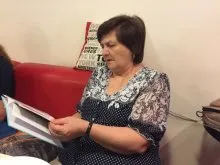
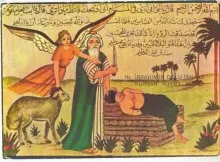
It is especially valuable when representatives of the society into whose language the Bible is being translated become ardent readers of the Bible of their own accord.
“When I started working in the project more than 20 years ago, I was not a believer, but I got to know and love God through this work,” the Adyghe translator testifies. “I am especially happy to work on the Old Testament. I fell in love with the book of Deuteronomy to such an extent that I myself asked for permission to translate it. In the process of working on Deuteronomy, I discovered that this book was like a key to understanding the whole Old Testament. I love Israel and I love the people of God, who suffered so much throughout their whole history to stay true to their faith. During my study-tour in Israel a few years ago, I realised that Jewish history is a mysterious phenomenon that still remains unsolved.
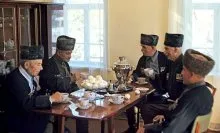
The Biblical texts translated into Adyghe often become seeds that fall on fertile soil. Here are several episodes from the Adyghe project co-ordinator’s own experience that she shared with IBT:
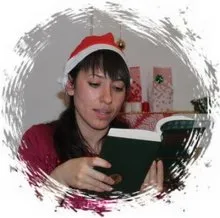
One Adyghe Christian woman used to listen to Proverbs in Adyghe while driving her car, and one time she left the CD in the car. The next day her son was driving, and the CD started playing from the beginning. The young man’s ride that day was long, and thus he listened to everything that was recorded on that disc. He was deeply impressed. He came home and asked his mother where she got that disc from. He was shocked to learn that the text was from the Christian Bible. He was a Muslim and his previous attitude to the Bible was rather hostile. After this, his attitude has changed and he has expressed eagerness to listen to more Scripture portions, though he still paradoxically refuses to read the Bible texts himself.
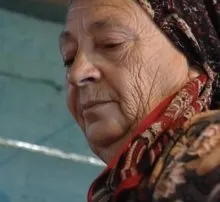
Over the past decade, the translation team has published several OT books and is getting closer and closer to producing a full Bible in their mother tongue. The Adyghe team members are very creative in their approach. Thus, the book of Proverbs was audio recorded by professional actors, and beautiful videos with Adyghe landscapes and ethnic music were produced for 5 Psalms in the Adyghe translation. A bilingual Adyghe-Kabardian edition of Ecclesiastes is planned for publication in 2019. This will be accompanied by an audio recording and decorated with a traditional ornament on the cover. We hope that the Bible will truly be treasured by this Caucasian people, whose own culture seems close to the Biblical world in so many aspects.
We would greatly appreciate your financial assistance towards this project.
If you prefer to send your donation through a forwarding agent in the U.S. or Europe,
please write to us and we'll provide the details of how this can be done.
IBT Russia/CIS is a non-profit organization financed through contributions from individuals, sponsoring organizations and foundations.
You can donate to IBT:
Through: AO UniCredit Bank, Moscow
SWIFT: IMBKRUMM
In favour of: Institute for Bible Translation
Address: 119334, Russia, Moscow, Andreevskaya nab. 2
TIN (INN) 7736231521
9-digit Bank identification code in Russian banking system: 044525545
Account no. (IBAN):
634261 USD 4020 02 001 or 40703840700010142881
634261 EUR 4020 02 001 or 40703978700010366720
634261 GBP 4020 02 001 or 40703826600010366723
Through: NOSTRO ACCOUNTS OF AO UNICREDIT BANK, MOSCOW:
USD JPMORGAN CHASE BANK N.A., NEW YORK SWIFT CODE: CHASUS33
EUR UNICREDIT BANK AG (HYPOVEREINSBANK) , MUNICH SWIFT CODE: HYVEDEMM
EUR UNICREDIT BANK AUSTRIA AG, VIENNA SWIFT CODE: BKAUATWW
EUR UNICREDIT S.P.A., MILANO SWIFT CODE: UNCRITMM
GBP THE ROYAL BANK OF SCOTLAND PLC, LONDON SWIFT CODE: RBOSGB2L
Important! In the field "designation" write "CHARITY DONATION"
For more information address IBT
You may sign up to receive our Russia/CIS monthly English newsletter here
